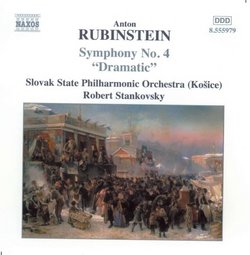| All Artists: Rubinstein, Stankovsky, Slovak State Phil Orch Title: Symphony 4: Dramatic Members Wishing: 0 Total Copies: 0 Label: Naxos Release Date: 8/20/2002 Genre: Classical Style: Symphonies Number of Discs: 1 SwapaCD Credits: 1 UPC: 747313597925 |
Search - Rubinstein, Stankovsky, Slovak State Phil Orch :: Symphony 4: Dramatic
 | Rubinstein, Stankovsky, Slovak State Phil Orch Symphony 4: Dramatic Genre: Classical
|
Larger Image |
CD Details |
CD ReviewsRubinstein Reconsidered Joshua Grasso | Oxford, OH USA | 09/24/2005 (5 out of 5 stars) "If anti-semitism is alive and well today, imagine the atmosphere of 19th century Russia (not that continental Europe was so far advanced, as a quick look at Mendelssohn's biography reveals). Still, I imagine the complete and utter neglect of Rubinstein's music after his death was largely due to his Jewishness. The Five had nothing but contempt for his music, led by the famous anti-semite Balakirev, whose views were famously recorded (and detested) by Rimsky-Korsakov. Luckily, most of us can now realize that the errors of history can be atoned, in part, by a more civilized appreciation of Jewish music and musicians. Rubinstein now appears--at least to my ears--as an extremely accomplished composer who rightfully incured Liszt's jealousy (and who also dismissed him in terms that suggest tones of anti-semitism, if not outright professional envy).
I initially bought this disc and Symphony No.2 "Ocean" out of curiosity, especially since they were so cheap. I've played them over and over again, delighting in novelty when I expected formula, melodies when I expected bombast, and fire when I expected coal. Rubinstein is a clever synthesis of Beethoven, Mendelssohn, Chopin, and Liszt, though he lacks the true originality of any of these composers. Nevertheless, he learned their lessons well and wrote the best symphonic music before Tchaikovsky, though it certainly deserves to be as well known as Tchaikovsky's first three symphonies (which owe him quite a bit of debt!). Rubinstein's so-called "Dramatic" symphony actually lives up to its title, at least better than Schubert's "Tragic" is tragic, or his "Unfinished" unfinished, for that matter. It opens with a foreboding, Lisztian theme, which is developed in interesting and exciting ways. It's not extraordinarily original music, of course, but it not too far below Liszt's symphonic works, either, and "sounds" more nimble than the Faust or Dante symphonies, to say nothing of his numerous symphonic poems. Rubinstein sounds like an extremely fluent composer who had a lot to say, and thought of creative ways to say it--even in a symphony that runs just over an hour. The first movement alone is 23 minutes, which seems to embody the formulaic excess of many a Romantic composer. But every movement held my attention, especially the fiery Presto, which has something of an impetuous, Faustian character. The Adagio is the shortest movement, not as profoundly lyrical as Borodin or Tchaikovsky, but very pretty all the same. The finale returns to the same atmosphere as the opening, very dramatic, exciting, and all around excellent romantic fare. I heartily recommend this and his Second Symphony, which seems totally excessive with 7(!) movements and 72 minutes of music. Yet it is even more of a piece than the 4th symphony, and justifies each movement that Rubinstein added after the premier (when it was only 4 movements). Rubinstein got a bad rap, and while he will never share the concert hall with Tchaikovsky, Rimsky, or Rachmaninov, he would do quite nicely in your cd player for an hour or two. Though the sound is admittedly not top quality, the orchestra plays with fire and committment, and is a persuasive interpreter of this impressive romantic score." |

 Track Listings (4) - Disc #1
Track Listings (4) - Disc #1